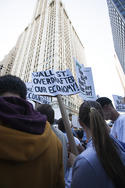Treating urbanisation as some sort of homogeneous movement, a driver of an increasingly interdependent world of shared values, behaviour, and prosperity is to oversimplify. There may be some common drivers, but urbanisation in the 21st century is likely to be quite different from urbanisation in the 20th century. Suggesting a universal approaches to governing, managing and planning cities is providing answers without knowing the questions. read more »
Urban Issues
Urban Violence Abroad: An Arab Spring and a British Autumn?
- Login to post comments
The U.K. Riots And The Coming Global Class War
The riots that hit London and other English cities last week have the potential to spread beyond the British Isles. Class rage isn’t unique to England; in fact, it represents part of a growing global class chasm that threatens to undermine capitalism itself. read more »
Who Lost the Middle Class?
Forty years from now, politicians, writers, and historians may struggle to understand how America, once the quintessential middle-class society, became as socially stratified as Europe or even Brazil. Should that dark scenario come to pass, they would do well to turn their attention first to New York City and New York State, which have been in the vanguard of middle-class decline.
It was in mid-1960s New York—under the leadership of a Barack Obama precursor, Hollywood-handsome John Lindsay—that the country’s first top-bottom political coalition emerged. In 1965, Gotham had more manufacturing jobs than any other city in the country. read more »
Biggest Boomer Towns
The boomer generation, spawned (literally) in the aftermath of the Second World War, will continue to shape the American landscape well into the 21st Century. They may be getting older, but these folks are still maintaining their power. Those born in the first ten years of the boomer generation — between 1945 and 1955 — number 36 million, and they will continue to influence communities and real estate markets across the country, especially as they contemplate life after kids and retirement. read more »
Commercial Real Estate: Shrinking to Fit
We are going to need less commercial real estate in the future, at least on a per-unit-of-population basis. Advances in communications technology are causing profound and sometimes unanticipated changes in our lives.
Retail Markets
The coming change is most obvious in retail markets. Americans are increasingly shopping online. However, we’ve really just started to scratch the surface. According to the U.S. Census Bureau’s 2009 E-Stats report issued in May, 2011, E-commerce only accounted for 3.99 percent of U.S. retail sales in 2009. read more »
Queensland’s Future: Diverse and Dispersed
I was recently asked to outline my thoughts on how the Queensland urban landscape might look 40 to 50 years from now. Go on, you can laugh. I did too. It’s hard enough to forecast the next 12 months, let alone two generations away, but I’ve given it a go, of sorts, so here it is: read more »
- Login to post comments
The Evolving Urban Form: Los Angeles
Los Angeles has grown more than any major metropolitan region in the high income world except for Tokyo since the beginning of the twentieth century, and also since 1950. In 1900, the city (municipality, see Note) of Los Angeles had little over 100,000 people and ranked 36th in population in the nation behind Allegheny, Pennsylvania (which has since merged with Pittsburgh) and St. Joseph Missouri (which has since lost more than one quarter of its population). read more »
The Shifting Geography of Black America
Black population changes in various cities have been one of the few pieces of the latest Census to receive significant media coverage. The New York Times, for example, noted that many blacks have returned to the South nationally and particularly from New York City. The overall narrative has been one of a “reverse Great Migration.” But while many northern cities did see anemic growth or even losses in black population, and many southern cities saw their black population surge, the real story actually extends well beyond the notion of a monolithic return to the South. read more »
Banana-nomics
The price of bananas is again making headlines as it pushes up inflation and threatens rising interest rates. But what’s the price of the humble ‘nana got to do with property markets? Plenty.
Banana prices have risen almost 500% since Cyclone Yasi wiped out much of north Queensland’s banana crop earlier this year. The immutable laws of supply and demand dictate that when supply falls relative to demand, prices will rise. read more »
Sustaining the Suburbs
The proposition is simple, if not overwhelming. If we want sustainable cities – however you define “sustainable” – we had better put some effort into the quality of suburban life. We need to get over denigrating suburbs and sprawl. That simply ducks the issue of where and how most people spend most of their time. We need to moderate a preoccupation with promoting CBD and big centre lifestyles. Those are places that people want visit, but not necessarily where they want to live. read more »






















